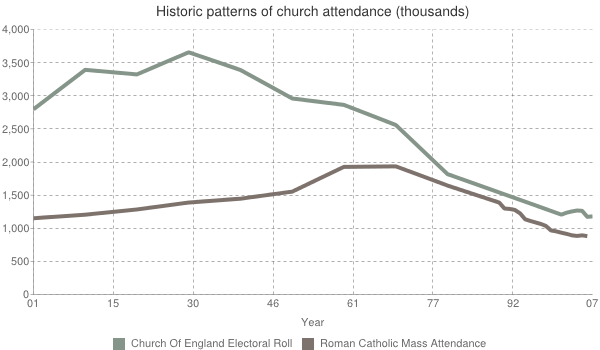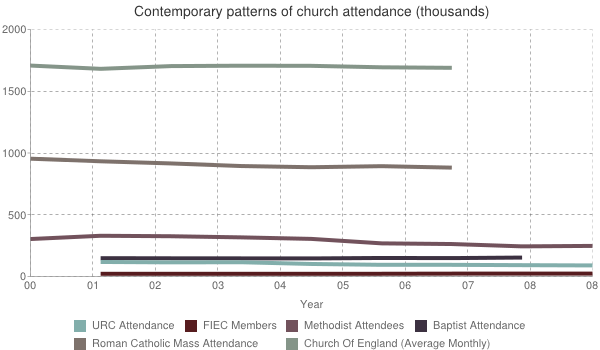Other UK Churches
Date added: 09/08/18
Roman Catholics
A definition
The Catholic Church dates itself to the arrival of St Peter in Rome, and is one of the oldest Christian Church organisations. However as a separate entity it dates from the Great Schism when the Eastern and Western parts of the Church separated in the eleventh century.
Today there are around five million Catholics in the UK, which is about 8% of the population, but only about one million attend church regularly. Catholics are encouraged to attend weekly mass and are under an obligation during the Easter season to attend the sacraments of reconciliation (formerly known as confession) and holy communion.
The Roman Catholic Church is present in all four countries in the UK, representing nearly all the Catholics.
Mass attendance

The figure 'Historical patterns of church attendance' shows that the Roman Catholic church grew during the first half of the 20th century probably mainly from Irish immigration. The burst in the 1950s to a peak in the 1960s is probably due to post-war refugees and other immigrants. Since then mass attendance has fallen but the figure 'Contemporary patterns of church attendance' shows that attendances have been broadly stable since 2005. In 2008 an average of 918,844 attended Roman Catholic churches each week, up from 915,556 the year before.

The suggestion that the stabilisation of Catholic attendances is purely a consequence of an influx of Polish immigrants is not entirely true. According to the Office for National Statistics the number of people leaving the UK for twelve months or more reached a record high in 2008 and Identity and Passport Service estimates also show that Poland was the most popular country of next residence for non-British emigrants in 2008. So, if anything, a fall in attendance in 2008 due to the Polish leaving the UK might have been expected.
Orthodox
Definition
The Orthodox churches date back to the Apostles. There were 5 ancient apostolic patriachates: Jerusalem (founded by St James), Antioch (founded by St Peter), Alexandria (founded by St Mark), Rome (st Peter [after Antioch of course] and St Paul) and Constantinople (St Andrew). In the tradition of the Church St Peter was bishop of Antioch and then later Rome. The Eastern (Orthodox) Church claim legitimacy from St Peter as bishop of Antioch whilst the Western (Catholic) Church claims "primacy" from St Peter as bishop of Rome. In the Eastern Tradition these 5 are equal.
After the Great Schism when the Roman Church separated in 1054, claiming that Rome had primacy over the others, there were then 4 ancient Orthodox patriachates. The Eastern Orthodox Churches are those in Europe (Greek, Russian, Romanian, etc.) The 'Eastern' refers to the Eastern part of the Roman Empire (the 'Western' being the Roman Catholic Church). The split between the Oriental Orthodox and Eastern Orthodox goes back to the Council of Chalcedon in AD 451.
There is one Eastern Orthodox patriarchate because Constantinople is the only ancient patriarchate for the Eastern Orthodox churches. There are 3 ancient Oriential Orthodox patriarchates which are Alexandria in Egypt (Coptic), Antioch in Syria (Syriac) and Jerusalem.
The Oriental Church was that part of the Church which was outside Europe in the Middle and Near East (Jerusalem, Syria, Armenia) and Africa (Egypt & Ethiopia). St Thomas is said to have been to India in AD 52 and the Indian Orthodox Church (part of the Syriac tradition) dates from then.
There is another church called the Assyrian Church of the East which is technically neither Eastern Orthodox nor Oriental Orthodox.
In 2005, the majority of Orthodox churches in the UK today were focused around immigrants from Cyprus, attending the Greek Orthodox church.
Orthodox statistics
As can be seen, the Orthodox church has been growing for many years. Partly because of its own growth related activities such as church planting, and partly due to the level of immigration. In 1979, we estimate there were 97 Orthodox churches in the UK and 114 in 1989. By 1998 there were 258, 317 in 2005 and we estimate there are 257 today.
{loadposition rt_download}
Back